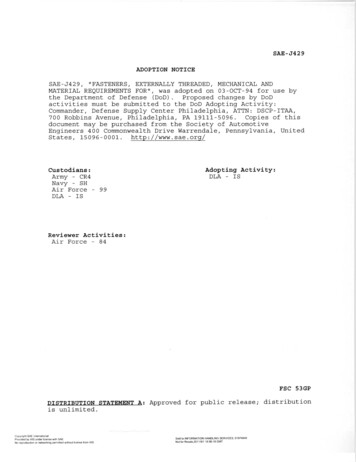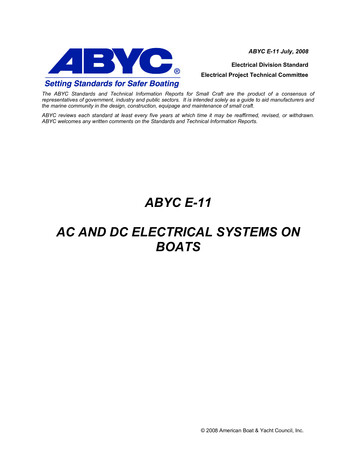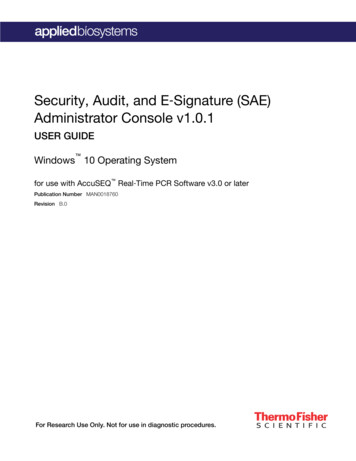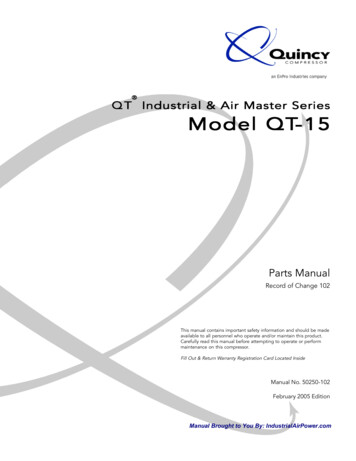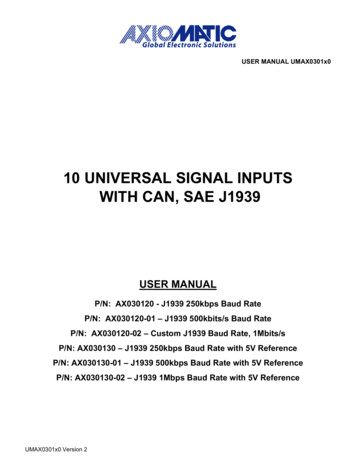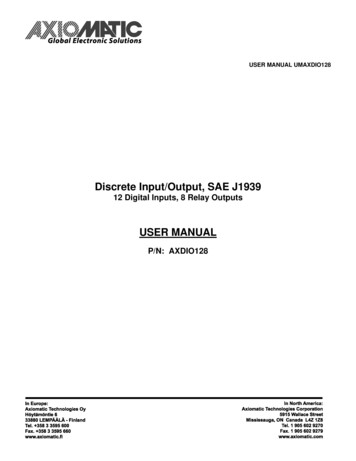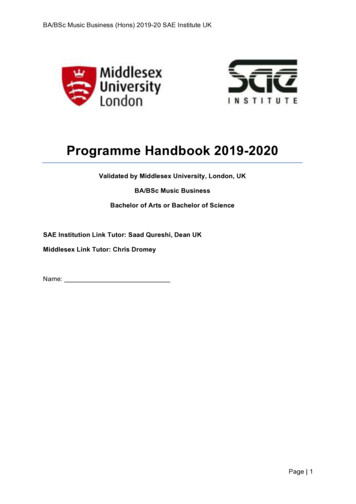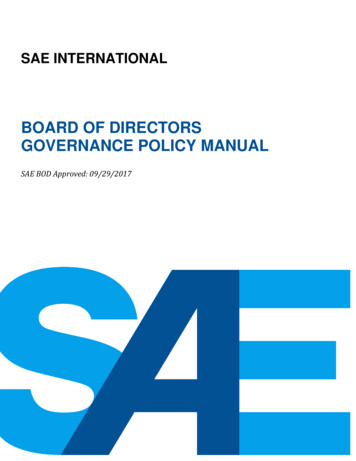
Transcription
SAE INTERNATIONALBOARD OF DIRECTORSGOVERNANCE POLICY MANUALSAE BOD Approved: 09/29/2017SEPTEMBER 2017
POLICY TITLEGOVERNANCE POLICY MANUAL – TABLE OF CONTENTSPOLICYNUMBERREVISION DATEIntroductioni09/2017Purposes, Mission and Visionii2015E-112/2010Role of the Board of DirectorsG-109/2017Board Governance & ConductG-209/2017Code of Ethical ConductG-309/2017Conflict of Interest PolicyG-409/2017Whistleblower PolicyG-509/2017Role of the President & Chair of the BoardG-609/2017Role of the Sector Vice PresidentsG-710/2016Role of the TreasurerG-809/2017Role of the SecretaryG-909/2017Board Committees and SubteamsG-1009/2017Role of the Administrative Committee and TrusteesG-1109/2014Role of the Special Issues SubteamG-1209/2017Role of the Awards and Scholarships CommitteeG-1304/2017Role of the Bylaws SubteamG-142015Role of the Compensation CommitteeG-1510/2016Role of the Executive Nominating CommitteeG-1609/2017Role of the Fellows CommitteeG-1703/2013Role of the Finance CommitteeG-1803/2013Role of the Financial Audit CommitteeG-1903/2013R-12015ENDS POLICYEnds StatementCOMMITTEES & SUBTEAMSOFFICESPOLICIESGOVERNANCE POLICIESRELATIONSHIP POLICYRelationship with the Chief Executive OfficerLIMITATIONS POLICIESChief Executive Officer Limitations PolicyL-101/2011Presidential Limitations PolicyL-209/2017Treasurer Limitations PolicyL-309/2017SAE InternationalBoard of DirectorsGovernance Policy Manual
POLICY TITLEGOVERNANCE POLICY MANUAL – TABLE OF CONTENTSPOLICYNUMBERREVISION t Acceptance PolicyA-412/2013Governance Organization ChartA-503/2013Intellectual Property and Usage PolicyA-62014Presidential Travel Expense PolicyA-709/2013Processing Board Business (Agenda); Processing Board Business(Agenda) New Ends; Processing Board Business (Agenda) MonitoringPerformance; Processing Board Business (Agenda) Revisiting MeansPolicies and Processing Board Business (Agenda) Incidental InformationA-804/2005SAE Investment PolicyA-92016A-1009/2017Financial Management Policy –21 sted.Investment Policy Seeking Total Return (15 P.C.S §5548(c))SAE Member Discipline ProcedureThe SAE Board of Directors Governance Policy Manual is a living document; content is updated on a continuous basis.For copies of an updated page, please contact the Office of the Secretary at Secretary@sae.orgSAE InternationalBoard of DirectorsGovernance Policy Manual
INTRODUCTIONEffective leadership requires that the Board of Directors provide the Society’s vision. To do so, the Board must firsthave a comprehensive vision of its own job. That role is best conceived neither as a volunteer-helper nor as awatchdog, but rather as a trustee-owner. Policy governance (or Carver governance) is an approach to governancethat emphasizes values, vision and strategy, and empowers the Board of Directors (“Board”), Board Committees,and the Chief Executive Officer.According to the principles of policy governance, the Board imbeds its values and wisdom within the following fourpolicy types:1.Ends PoliciesThrough Ends policies, the Board defines which human needs are to be met and for whom and at what cost.Ends policies are written with a long-term perspective; these policies embody most of the Board’s part of longrange planning.2.Governance PoliciesThrough Governance policies, the Board expresses the philosophy, accountability and specifics of its own job.3.Relationship PoliciesThrough Relationship policies, the Board clarifies the way it delegates its authority to the Chief ExecutiveOfficer, as well as how it evaluates performance.4.Limitations PoliciesThrough Limitations policies, which apply to the President, Treasurer, and Chief Executive Officer, the Boardestablishes the boundaries of acceptable behavior and activities of those positions and groups. Long-term ends of SAE What good? For whom? At what cost? Acceptable conduct For officersSAE ionsPoliciesRelationshipPoliciesBoard of Directors How the Board governs Roles of officers Roles of committees Delegation of power Performance monitoringGovernance Policy Manual
PURPOSESThe purposes of SAE International are: to advance the knowledge of the arts, sciences, standards, and engineering practices connected with thedevelopment, design, construction, and use of self-propelled machines, prime movers and related equipment (allherein collectively called "mechanisms"); to preserve and improve the quality of life in the production and use of such mechanisms; to maintain a library of publications; to promote through meetings, lectures, courses, seminars and the presentation and discussion of scientific andengineering papers a better understanding of such mechanisms; to develop technical and scientific reports, including engineering standards and recommended practices, inconnection with the development, design, construction, use, and reuse of such mechanisms, and publish anddistribute such reports for the benefit of mankind; and generally to provide for or carry on such other activities as may be necessary, incidental, convenient, or desirableto accomplish fully the foregoing purposes.MISSIONSAE International is a global body of scientists, engineers and practitioners that advances self-propelled vehicle andsystem knowledge in a neutral forum for the benefit of society.VISIONSAE International is the leader in connecting and educating engineers while promoting, developing and advancingaerospace, commercial vehicle and automotive engineering.SAE InternationalBoard of DirectorsGovernance Policy Manual
ENDS POLICYE-1SAE International enterprise is preeminent in serving its members and industry, by providing: A global network of students, scientists, engineers, practitioners and institutions. Technical publications that disseminate knowledge. Relevant, timely-consensus standards that drive quality, performance, safety, cost optimization of products andproduct-life cycles. Conferences and symposia that add value through the first-hand transfer of technical knowledge. Lifelong learning, education, development and recognition for individual members, institutional stakeholders andthe broader workforce. Mutually beneficial government/industry/academic interfaces that provide information for the formation of soundpublic-policy decisions. Affiliated programs, products and services that add value and encourage innovation.SAE InternationalBoard of DirectorsGovernance Policy Manual
ROLE OF THE BOARD OF DIRECTORSG-1Scope / AuthorityThe Board derives its authority from and is accountable to the members of SAE International (“SAE”) for achievingthe Purposes set forth in the Articles of Incorporation and the Bylaws. On behalf of the members, the Board hastotal authority over and total accountability for SAE. As a 501(c)(3) tax-exempt scientific, charitable and educationalnot-for-profit corporation, SAE exists to benefit society through achievement of its mission.Job Products / Deliverables1.Strategic direction and governance leadership of SAE, consistent with the Purposes expressed by themembers.2.Written policies that direct and govern the organization, based on the Board-adopted tenets of Carver policygovernance.2.1 Ends Policies: identify the long-term needs to be met by SAE, the intended recipients and the acceptablecosts thereof.2.2Governance Policies: define the Board’s philosophy and how it governs itself and the Board’s ownoperations.2.3Relationship Policies: specify the authority and responsibilities that the Board delegates to the chiefexecutive officer.2.4Limitations Policies: define the actions or activities of the President, Treasurer, and Chief ExecutiveOfficer that are prohibited by or unacceptable to the Board.3.Performance monitoring of the Chief Executive Officer.4.Fiduciary oversight of SAE’s assets, financial position, and legal and tax statuses.5.Compliance monitoring of board policies. A given board policy may be monitored as follows:5.1Performer's Report Disclosure of compliance information to the Board from the Chief Executive Officer.5.2External Report Discovery of compliance information by a disinterested, external auditor, inspector or judge who isselected by and reports directly to the Board. Such reports must assess performance only againstpolicies of the Board, not those of the external party unless the Board has previously indicated thatparty's opinion to be the standard.5.3Direct Board Inspection Discovery of compliance information by a Board member, a Board Committee or the Board as awhole. This is a Board inspection of documents, activities or circumstances directed by the Board,which allows a “prudent person” test of policy compliance.6.Approvals of the following:6.1Governance document revisions:6.1.1 Articles of Incorporation (prior to a membership vote)6.1.2 Bylaws (prior to a membership vote)6.1.3 Governance Policy Manual6.1.4 Intellectual Property and Usage Policy6.1.5 Financial Management Policy6.1.6 Gift Acceptance Policy6.1.7 SAE Member Discipline Procedure6.1.8 Mission, Vision, Ends and Strategic Roadmap6.2Appeals decisions6.3Election of a member to SAE Fellow status6.4Awards and Scholarships:6.4.1 Annual Medal of Honor recipient6.4.2 Establishment/Elimination of Awards and Scholarships6.5Chief Executive Officer:6.5.1 Total compensation package6.5.2 Approval of Chief Executive Officer candidate6.5.3 Organizational/Performance Objectives6.5.4 Employment contractSAE InternationalBoard of DirectorsGovernance Policy Manual
ROLE OF THE BOARD OF DIRECTORS (CONTINUED)6.66.7G-1Financial:6.6.1 Annual Business Plan6.6.2 Financial Management Plan6.6.3 Loans or long-term expenditures to SAE affiliates6.6.4 Presidential Travel Expenses Policy6.6.5 Investment Policy Seeking Total Return (15 P.C.S §5548(c))6.6.6 SAE Investment PolicyGovernance:6.7.1 Annual agenda6.7.2 Written reports of Board Committees6.7.3 Establishment / elimination of Board Committees (except for those identified in the SAEBylaws)6.7.4 Merger, acquisition, or establishment of a new subsidiary or affiliate6.7.5 Meeting minutes6.7.6 Policy development6.7.7 Nominees for Board Committees6.7.8 Vacated Board positionsCompositionThe Board shall include persons of character, integrity, talent and experience who are loyal to SAE’s mission andseek to foster diversity across the organization. Diversity, as defined by the Board, includes but is not limited to,culture, national origin, age, gender, technical/managerial position, race, physical ability, industry sector andgeographic location.SAE InternationalBoard of DirectorsGovernance Policy Manual
BOARD GOVERNANCE & CONDUCTG-2The Board, to fulfill its responsibilities and deliver its job products, follows an annual governance agenda thatensures review of current and consideration of new policies and performance monitoring of the Chief ExecutiveOfficer, and compels the Board to continually assess and improve its own governance and performance.1.2.3.4.5.6.7.8.9.Annual Governance Agenda and Governance CycleThe annual governance cycle starts with the Board’s approval of its annual agenda at the first meeting ofeach new Board.Board Meeting Agendas2.1The Chair, with input from the Chief Executive Officer and the Secretary, shall propose an agendaafter evaluating potential new business items submitted by Board members and others.2.2Board agendas are approved by the Board at the beginning of each meeting.2.3Agendas and related documents or motions for Board approval shall be provided to Board membersten (10) days prior to the Board meeting.Types of Board Sessions3.1Closed Session – Board members only.3.2Restricted Session – Board members with invited staff and/or advisors, as appropriate.3.3Open Working Session – Board, staff and other participants.Types of Board Meetings4.1Face-to-face meetings, which may include members participating by telephone or othercommunications technology.4.2Telephone or other communications technology meetings.Board Meeting Voting5.1Board members have a responsibility to present their views and address relevant issues. Consensusshall be sought for decisions put before the Board. Consensus is defined as a minimum of seventypercent (70%) “fully support” and thirty percent (30%) “can live with it.”5.1.1A majority vote shall prevail when consensus cannot be reached.Electronic Voting6.1Board voting may be conducted electronically between Board meetings, but according toPennsylvania law requires unanimous consent of all Board members eligible to vote.6.1.1Electronic voting that obtains unanimous consent of all Board members eligible to vote shallbecome effective immediately after the close of voting.6.1.2Electronic voting that does not obtain unanimous consent shall require a confirmation vote atthe Board’s next meeting.6.2The voting period on electronic business closes thirty (30) days after the posting.6.2.1At the request of the President, on time-sensitive votes the voting period on electronicbusiness may be reduced to ten (10) days after posting.Board Meeting Minutes7.1Minutes shall be provided to Board members no later than twenty-one (21) days following the meeting.7.2Approval of minutes shall be conducted by electronic voting.7.2.1The voting requirement identified in 6.1.1 and 6.1.2 shall apply.Board OrientationNew Board members receive an orientation from the Secretary on SAE governance, finances, andoperations. Existing Board members, including the President, may also participate in the orientation ifdesired.Policy Review and Revision9.1The Secretary distributes to each member of the Board a copy of the proposed new or amended policyand its rationale at least ten (10) days in advance of the Board meeting at which the first reading isscheduled.9.2The Board may amend its policies provided that the first reading of a new or amended policy isdiscussed during a meeting of the Board, at which time a non-binding consensus vote may be taken.SAE InternationalBoard of DirectorsGovernance Policy Manual
BOARD GOVERNANCE & CONDUCT (CONTINUED)9.3G-2At the direction of the President & Chair, the second reading and vote on the proposed new or amendedpolicy, including further revision arising from the first reading, may be conducted during a Board meetingor via electronic voting. The new or amended policy shall take effect immediately upon completion of avote during a meeting of the Board (provided either consensus or a majority vote is obtained) or anelectronic vote (provided unanimous consent of all Board members eligible to vote is obtained).SAE InternationalBoard of DirectorsGovernance Policy Manual
CODE OF ETHICAL CONDUCTG-3SAE’s policy is to uphold the highest legal, ethical and moral standards in business and personal conduct. Donors andvolunteers support SAE because they trust the Society to be good stewards of their resources, and to uphold rigorousstandards of conduct. SAE’s reputation for integrity and excellence requires compliance with all applicable laws andregulations, as well as a scrupulous regard for the highest standards of conduct and personal integrity.SAE shall comply with all applicable laws and regulations, and expects its Board members, Officers, SAEmembers/volunteers, staff, vendors, and consultants to conduct business in accordance with the letter and spirit of allrelevant laws; to refrain from any illegal, dishonest or unethical conduct; to act in a professional, businesslike manner;and to treat others with respect. Board members, Officers, and SAE members/volunteers should not use their positionsto obtain unreasonable or excessive services or expertise from the Chief Executive Officer, staff, and/or organizationsdoing business with SAE.1.2.3.4.5.Board members shall:1.1 Respect the confidentiality of sensitive issues.1.2 Only at the direction or approval of the President, interact with the public and press regarding SAEbusiness.Board members shall with respect to Board activities:2.1 Attend Board meetings regularly. Board members are expected to attend at least one face-to-facemeeting per year and, at all meetings, to attend the entire meeting. Any Board member absent for twoconsecutive meetings of the Board will receive a written notice from the Secretary. Upon a thirdconsecutive meeting absence, the Board member shall be automatically excused from his/her duties(Bylaws Article V, Section 5.7) and the resulting vacancy may be filled (Bylaws Article V, Section 5.8).2.1.1 For purposes of Board attendance, a “meeting” is defined as a meeting during which a vote willbe taken on Board business (as opposed to a meeting for purely informational purposes),whether a virtual or a face-to-face meeting (with virtual capability). “Consecutive meetings,” forpurposes of board attendance, are “meetings” that follow one another, regardless of calendaryear or board term. For example, attendance at a non-voting meeting scheduled between two“meetings” from which a Board member has been absent does not operate to create a breakbetween missed “consecutive meetings.” Absence from the next “meeting” by the Board memberwould result in removal from the Board.2.1.2 If a Board member is removed from his/her duties, the Secretary will so notify the removed Boardmember in writing and the Board’s next set of meeting minutes shall reflect this action.2.2 Be prepared for and participate in Board meeting discussions and voting.2.2.1 Once voting is completed, all members shall support the Board’s decision.2.3 Become familiar with the Governance Policy Manual, Bylaws and legal and fiduciary responsibilities.2.4 Contribute individual judgment and expertise, including identifying any actions and/or conditions that arenot in compliance with the Bylaws and the Governance Policy Manual and bringing the information tothe attention of the President and/or the Secretary.2.5 Complete inter-meeting Board business and electronic voting.Board members shall, with respect to personal integrity and professionalism:3.1 Promote and participate in a climate of mutual trust, respect and teamwork.3.2 Be loyal to the best interest of the organization and the Purposes established by the members, includingopenly speaking up on behalf of the membership and dissenting as deemed appropriate.Board members shall refrain from accepting gifts, services, discounts, entertainment or considerations of anykind from suppliers and vendors. It is never permissible to accept a gift in cash or cash equivalent such asstocks or other forms of marketable securities of any amount.Failure to comply with the Code of Ethical Conduct may result in a request, from the Secretary, President orthe Board, for the resignation of a Board member.SAE InternationalBoard of DirectorsGovernance Policy Manual
CODE OF ETHICAL CONDUCT (CONTINUED)G-3In general, the use of good judgment based on ethical principles shall guide Board members with respect to lines ofacceptable conduct. However, if a situation arises where it is difficult to determine the proper course of conduct, orwhere questions arise concerning the propriety of certain conduct by an individual or others, the matter should bebrought to the attention of SAE. Board members should raise any such concerns with the President & Chair, Treasurerand/or Secretary. In all questions involving ethics and conduct, the Board shall make relevant determinations, exceptthat any individual whose conduct is at issue shall not participate in such decisions.A Certification to Policies and Agreement form shall be distributed to the Board for signature and collected annually.SAE InternationalBoard of DirectorsGovernance Policy Manual
CONFLICT OF INTEREST POLICYG-4The purpose of the Conflict of Interest Policy is to prevent any situation that involves or may involve a conflict betweenpersonal interest and the interest of SAE or result in the personal financial, professional and/or political gain on thepart of a Board member, Officer, or SAE member/volunteer at the expense of SAE, its members, or stakeholders.As in all other facets of their duties and responsibilities, SAE Board members, Officers, and members/volunteersdealing with customers, suppliers, contractors, competitors or any person doing or seeking to do business with SAE,are to act in the best interest of SAE. Each Board member, Officer, member/volunteer shall make prompt and fulldisclosure in writing to the Secretary of any potential situation which may involve a conflict of interest.Board members are to perform their duties in good faith, in a manner they reasonably believe to be in the best interestsof SAE and with such care, including reasonable inquiry, skill and diligence, as a person of ordinary prudence woulduse under similar circumstances.1.Potential Conflict of InterestFor the purpose of this policy, a potential conflict of interest is one in which a decision of a Board member couldaffect such person’s own personal financial, professional and/or political interests. Accordingly, the Boardadopts the following policy:1.1Board members shall not profit materially in their capacity as Board members from their affiliation withSAE, or favor the interests of others over the interests of SAE or bring their interests into conflict orcompetition with the interests of SAE. Board members should be aware that conflicts of interest includeactual, apparent and potential material conflicts of interest.1.2Officers of SAE who simultaneously serve as a director, officer, partner, consultant or in any managerialcapacity with outside organizations or including other professional membership organizations havingobjectives similar to SAE must disclose that information in writing to the Secretary.1.3Annually, each Board member shall file with the Secretary a statement disclosing ownership by self (orfamily member) of a significant interest in any outside enterprise which does or seeks to do businesswith or is a competitor of SAE. Board members are required to file all material business, financial andorganizational interests and affiliations that they or persons close to them have which could be construedas related to the interests of SAE and might dissuade acting in the best interest of SAE. Disclosureshall also be made if a material conflict of interest arises in the course of the Board member’s service toSAE, whether arising out of the member’s employment, consulting, investments or any other activity.1.4Board members, Officers, and SAE members/volunteers shall not serve as a broker, finder, go-betweenor otherwise for the benefit of a third party in transactions involving or potentially involving SAE or itsinterests.1.5 Whenever the Board is considering a matter, including a contract or transaction with a SAE member orBoard member, that presents an actual or apparent material conflict of interest for a Board member, thatmember or Board member shall fully disclose the material facts as to his/her interest or relationship in orto such a matter, contract or transaction. The disclosure shall be recorded in the Board minutes. Thedisinterested Board members shall have the right to excuse such member from participating in thedeliberations and/or voting on the matter presenting the conflict.1.6 Whenever any member, as a consequence of Board membership, discovers an opportunity for businessadvantage that could be relevant to the activities of SAE, the opportunity belongs to SAE and the Boardmember will present such an opportunity to the Board. Only at such time as the Board, by recorded vote,determines not to pursue the matter and relinquish such an opportunity may the individual consider it amatter of possible material, personal benefit.1.7Board members shall refrain from accepting gifts, services, discounts, entertainment or considerationsof any kind from suppliers and vendors. It is never permissible to accept a gift in cash or cash equivalentsuch as stocks or other forms of marketable securities of any amount.A Certification to Policies and Agreement form shall be distributed to the Board for signature and collected annually.SAE InternationalBoard of DirectorsGovernance Policy Manual
WHISTLEBLOWER POLICYG-5IntroductionThe Code of Ethics adopted by SAE International requires all Board members, Officers, SAE member/volunteers, staff,vendors and consultants to observe high-standards in their business and personal conduct. All Board members,Officers, SAE members/volunteers and staff are expected to comply with the Board’s Code of Ethical Conduct andapplicable laws, and to report violations or suspected violations in accordance with this policy.Reporting of Concerns or ComplaintsBoard members, Officers, SAE members/volunteers, and staff are required to communicate suspected violations ofthe Code of Ethical Conduct, a possible violation or violation of laws, regulations, SAE International's policies, or awrongdoing or alleged retaliation to the President & Chair of the Board, Treasurer and/or Secretary. Likewise, if arepresentative of SAE, consultant, customer, or any person who conducts business with SAE International questionsthe legality of any of SAE's practices or procedures, that person must report suspected violations to the President &Chair of the Board, Treasurer and/or Secretary. Failure to report a violation, a complaint or any articulated concernabout a possible violation to SAE International may be subject to disciplinary action for remaining silent.While the reporter of the violation need not identify himself/herself, for an effective investigation to be conducted thereporter should provide SAE with as much detailed information as possible concerning the alleged violation, includingthe substance of the incident, where and when the incident occurred, and the names and titles of the individualsinvolved.Illustrative Types of ConcernsThe following is a non-exhaustive list of the kinds of incidents and improprieties that should be reported:1. Supplying false or misleading information on SAE’s financial, legal or other public documents, including InternalRevenue Form 990.2. Providing false information to or withholding material information from SAE’s Board, auditors, legal counsel ormanagement.3. Destroying, altering, mutilating, concealing, and covering up, falsifying or making a false entry in any record thatmay be connected to an official matter or proceeding, in violation of federal or state law, regulations or SAEpolicies.4. Altering, destroying, or concealing a document or attempting to do so, with the intent to impair the document’savailability for use in an official matter or proceeding or otherwise obstructing, influencing or impeding any officialmatter or proceeding, in violation of federal or state law, regulations or SAE policies.5. Embezzlement, self-dealing, private inurement (i.e., SAE earnings inuring to the benefit of a Board member,volunteer, or staff) and private benefit (i.e., SAE assets being used by anyone in the organization for personalgain or benefit).6. Paying for services or goods that are not rendered or delivered.7. Using remarks or actions of a sexual nature that are not welcome and are likely to be viewed as personallyoffensive, including sexual flirtations, unwelcome physical or verbal advances, sexual propositions, verbal abuseof a sexual nature, the display of sexually suggestive objects, cartoons, or pictures, and physical contact of asexual or particularly personal nature.8. Using epithets, slurs, negative stereotyping, and/or threatening, intimidating or hostile acts that relate to race, color,religion, gender, sexual orientation, national origin, age, disability or other legally protected status.9. Circulating or posting written or graphic material that denigrates or shows hostility or aversion toward an individualor group because of race, color, religion, gender, sexual orientation, nationality, age, disability or other legallyprotected status.10. Discriminating against an individual due to a person’s race, color, religion, gender, sexual orientation, nationalorigin, age, physical or mental impairment, veteran status or other legally-protected status.11. Violating the Code of Ethical Conduct and/or the Conflict of Interest Policy.12. Facilitating or concealing any of the above or similar actions.SAE InternationalBoard of DirectorsGovernance Policy Manual
BOARD WHISTLEBLOWER POLICY (CONTINUED)G-5ConfidentialityAll communications under this policy shall be treated in a confidential manner, except to the extent necessary:1. To conduct a complete and fair investigation, or2. For review of SAE operations by the Board, Financial Audit Committee, independent public accountants and/orexternal legal counsel.SAE International will promptly and fully investigate all reports. Reporting violations or possible violations should bedone in accordance with this Policy.RetaliationNegative or adverse action is not to be taken against any Board member, Officer, SAE member/volunteer or staff formaking a good-faith report of a possible violation of its Code of Ethical Conduct or applicable laws, even if the reportis mistaken, or against the Board, Financial Audit Committee, independent public accountants, and/or legal counselwho assist in the investigation of a reported violation. Retaliation in any form shall not be tolerated. Any act of allegedretaliation should be reported immediately and shall be promptly investigated. A Board member who retaliates againstsomeone who has reported a violation in good faith is subject to discipline up to and including removal from theBoard. This policy is intended to encourage and enable individuals to raise serious concerns within SAE prior toseeking resolution outside the organization.ComplianceAny violation of this policy may result in member disciplinary action up to and including removal from the Board. Anyindividual having knowledge of any violation of the policy shall promptly report such violation to the President & Chairof the Board, Treasurer and/or Secretary or through th
SAE International Board of Directors Governance Policy Manual BOARD GOVERNANCE & CONDUCT G-2 The Board, to fulfill its responsibilities and deliver its job products, follows an annual governance agenda that ensures review of current and consideration of new policies and performance monitoring of the Chief Executive


